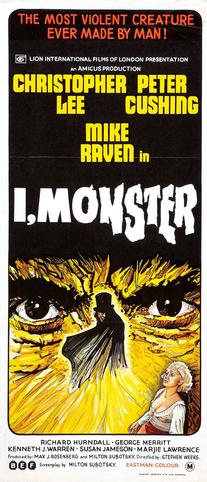| I, Monster | |
|---|---|
 Theatrical release poster | |
| Directed by | Stephen Weeks |
| Written by | Milton Subotsky |
| Based on | Strange Case of Dr. Jekyll and Mr. Hyde by Robert Louis Stevenson |
| Produced by | John Dark Max Rosenberg Milton Subotsky |
| Starring | Christopher Lee Peter Cushing Mike Raven Richard Hurndall George Merritt Kenneth J. Warren |
| Cinematography | Moray Grant |
| Edited by | Peter Tanner |
| Music by | Carl Davis |
| Distributed by | British Lion Films |
Release date |
|
Running time | 75 minutes 81 minutes (extended cut) |
| Country | United Kingdom |
| Language | English |
I, Monster is a 1971 British horror film directed by Stephen Weeks (his feature debut) and starring Christopher Lee and Peter Cushing. [1] It was written by Milton Subotsky, adapted from Robert Louis Stevenson's 1886 novella Strange Case of Dr. Jekyll and Mr. Hyde , with the main characters' names changed to Dr. Charles Marlowe and Mr. Edward Blake. [2] It was produced by Amicus.